Student interview: On getting admissions in foreign universities
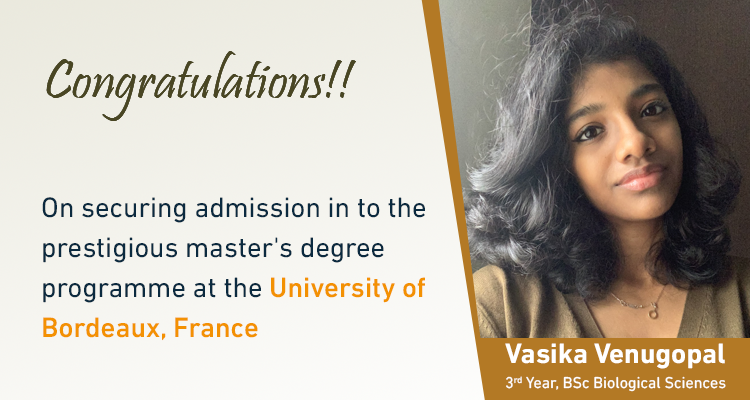 Ms Vasika Venugopal, a final year BSc Biology student at SRM University-AP has secured awe-inspiring admissions in a number of eminent higher education institutions inside and outside India. She is selected for the Master’s programme at the University of Tübingen, Germany; Charité -Universitätmedizin Berlin, Germany; University of Wuerzburg, Germany; Goethe-University, Frankfurt, Germany; University of Paris-Saclay, Paris, France; University of Bordeaux, Talance, France; Université de Paris, Paris, France; and for an Integrated PhD degree at National Centre for Biological Sciences (NCBS), Bangalore. She was also shortlisted in the following Universities viz Ludwig Maximilians Universität München, Germany (MSc Molecular and Cellular Biology); Ulsan National Institute of Science and Technology, South Korea; University of Bonn, Germany (MSc Neuroscience); JNCASR, Bengaluru (Integrated PhD Biological Sciences); and IISER, Pune (Integrated PhD Biological Sciences).
Ms Vasika Venugopal, a final year BSc Biology student at SRM University-AP has secured awe-inspiring admissions in a number of eminent higher education institutions inside and outside India. She is selected for the Master’s programme at the University of Tübingen, Germany; Charité -Universitätmedizin Berlin, Germany; University of Wuerzburg, Germany; Goethe-University, Frankfurt, Germany; University of Paris-Saclay, Paris, France; University of Bordeaux, Talance, France; Université de Paris, Paris, France; and for an Integrated PhD degree at National Centre for Biological Sciences (NCBS), Bangalore. She was also shortlisted in the following Universities viz Ludwig Maximilians Universität München, Germany (MSc Molecular and Cellular Biology); Ulsan National Institute of Science and Technology, South Korea; University of Bonn, Germany (MSc Neuroscience); JNCASR, Bengaluru (Integrated PhD Biological Sciences); and IISER, Pune (Integrated PhD Biological Sciences).
Here’s an exclusive interview with Ms Vasika Venugopal:
Hi Vasika, can you tell us how you developed your interest in neuroscience?
For as long as I could remember, I have held a deep-rooted interest in neuroscience. The brain is one of the finest examples of synergy. It has always baffled me that the stream of thoughts that we call consciousness could arise from a series of neurons firing action potentials from one point to another. The entire world around us is reconstructed only using receptors on neural tissue and neurotransmitters. In our head, we house a mere handful of a mass of cells, but “it can contemplate the meaning of infinity, and it can contemplate itself, contemplating the meaning of infinity.” I find that quite ironic and miraculous at the same time. When we look at the parts of the brain, we expect nothing magnificent to arise from it, but the magnitude of emotions we feel, thoughts that we manifest, and memories that we recall are all testament to something more. This is why I have chosen to pursue Neuroscience.
What is your motivation for choosing the University of Bordeaux, France among all other Universities?
After a period of deliberation, I have finally decided to accept the admission offer into the Bordeaux International Masters in Neuroscience Program at the University of Bordeaux, France. This international Master’s program provides a unique interdisciplinary and integrated training approach that covers all major topics of brain research, from normal brain functions to brain disorders. Neuroscience in Bordeaux has grown over the last 15 years to become one of the largest Neuroscience scientific communities in France and in Europe, with over 600 people working in the various Neuroscience laboratories of the University of Bordeaux. In order to meet the most important challenges facing Neuroscience research, all these laboratories are grouped within a virtual institute, called the Bordeaux Neurocampus, a multidisciplinary consortium of world-renowned scientists. Bordeaux Neurocampus offers, together with our international academic partners, excellent opportunities for traineeships.
Is there any scholarship offered in the University where you are enrolling into?
One of the key points of the program is that students are offered scholarships based on their performance. As for my admission, I am eligible for a partial tuition fee waiver. Students completing their traineeship in a laboratory of the University of Bordeaux receive a monthly stipend during the traineeship as well.
Can you brief the application process for those students who dream to study abroad?
In general, for applications to universities in France, you would have to apply through the Campus France website. However, for the universities that I had applied to, such as the University of Paris, the University of Bordeaux, and the University of Paris-Saclay, one could directly apply to the program itself. The application process is pretty simple, and you would require only basic documents such as an ID, academic transcripts, a bonafide certificate issued from the university, a proof of English proficiency, a letter of motivation, reference letters, your curriculum vitae, etc. I have written the DELF examination for French, and possess certifications from Alliance Francais. I believe this would also be helpful for other students as well. The search for programs in English might be exhaustive, and one might have to go through a university’s website before applying as some of the modules might be in French. Following applications, one would have to undergo interviews with the admission board, which is honestly the scariest part, and depending on your performance and application, your admission is decided. In the case of most German universities that I had applied to, I had to submit my application with the basic documents through the university website and was called for an entrance exam if my application was shortlisted. If my performance in the entrance exam was satisfactory, I would then be called for a minimum of one interview, and a maximum of two. In some cases, like the University of Wurzburg, you would also have to present your research work in a 10-minute presentation and defend your hypothesis through the questioning round that follows. Honestly, this part is very exciting! As a whole, the application process is intensive, but it is an opportunity for you to grow your network and learn to think in ways you haven’t before. I am still in contact with most of the professors that had interviewed me, and talking to different people has honestly helped grow my sphere, which has been hard due to the pandemic.
Amazing! Can you talk about the support that you have received from your department at SRM-AP during these application processes?
Throughout the rigorous processes of applications, professors from the Department of Biological Sciences were extremely helpful. Dr Manjunatha Thondamal’s knowledge of the French education system and his relentless aid in modifying my letter of motivation were extremely helpful. Prof Jayaseelan Murugaiyan and Dr Imran Pancha were incredibly patient with the number of recommendation letters they had to write for my applications. Each of them took their own time to help me pick universities and courses, discussing their pros and cons along the way. I have received a lot of support and advice from my department throughout my time at SRM for my education, internships, projects, and Master’s application, and I’ll always be grateful for that.
- Published in Biology News, News, Students Achievements
Department of Physics set to work on bilateral project with IIT Bhilai
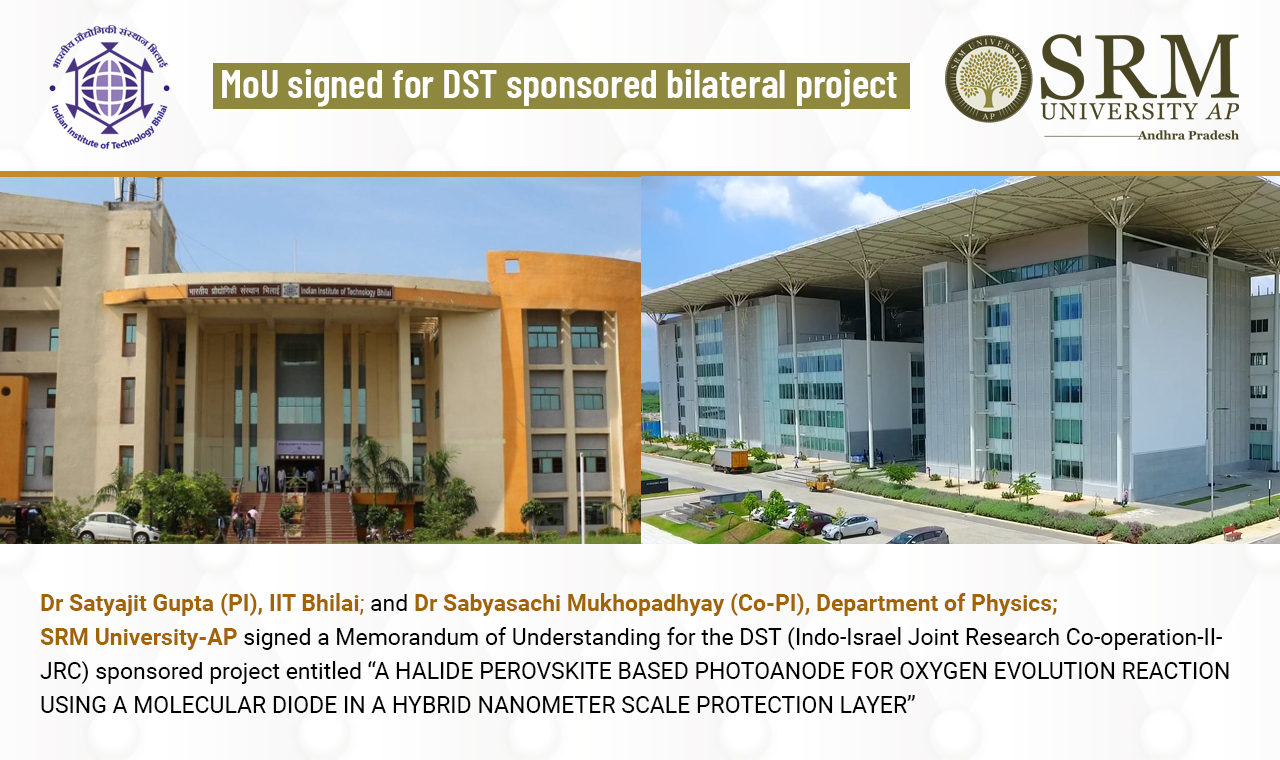 Dr. Satyajit Gupta (PI), IIT Bhilai, and Dr Sabyasachi Mukhopadhyay (Co-PI), Department of Physics, SRM University-AP has signed a Memorandum of Understanding for the DST (Indo-Israel Joint Research Co-operation-IIJRC) sponsored project entitled “A HALIDE PEROVSKITE BASED PHOTOANODE FOR OXYGEN EVOLUTION REACTION USING A MOLECULAR DIODE IN A HYBRID NANOMETER SCALE PROTECTION LAYER”, Sanction Order NO. – DST/INT/ISR/P-28/2020(G). The project is a bilateral project and Foreign PI is Dr Eran Edri, Department of Chemical Engineering, Ben-Gurion University of the Negev, Israel. This MoU will help Dr Mukhopadhyay to utilize the fund under this project as co-PI, and the facility of IIT Bhilai to complete the objective of the project.
Dr. Satyajit Gupta (PI), IIT Bhilai, and Dr Sabyasachi Mukhopadhyay (Co-PI), Department of Physics, SRM University-AP has signed a Memorandum of Understanding for the DST (Indo-Israel Joint Research Co-operation-IIJRC) sponsored project entitled “A HALIDE PEROVSKITE BASED PHOTOANODE FOR OXYGEN EVOLUTION REACTION USING A MOLECULAR DIODE IN A HYBRID NANOMETER SCALE PROTECTION LAYER”, Sanction Order NO. – DST/INT/ISR/P-28/2020(G). The project is a bilateral project and Foreign PI is Dr Eran Edri, Department of Chemical Engineering, Ben-Gurion University of the Negev, Israel. This MoU will help Dr Mukhopadhyay to utilize the fund under this project as co-PI, and the facility of IIT Bhilai to complete the objective of the project.
The Objectives of the MoU are to promote effective application of resources through Indo-Israel Joint Research Co-operation-(IIJRC) sponsored project, promote mentorship and research guidance, and cooperate in educational/research areas of mutual interest. It also aims to promote international collaborations through International travel of Party, hosting International delegates, and through a student exchange programme between Indian Institute/Universities and Ben-Gurion University of the Negev, Israel.
The MoU will provide a platform to share and exchange Best Practices, and facilitate exchange programmes for students. Dr Satyajt Gupta and Dr Sabyasachi Mukhopadhyay will provide training and development for students working under this joint project.
- Published in Departmental News, News, Physics News
Environment Conservation is Responsibility
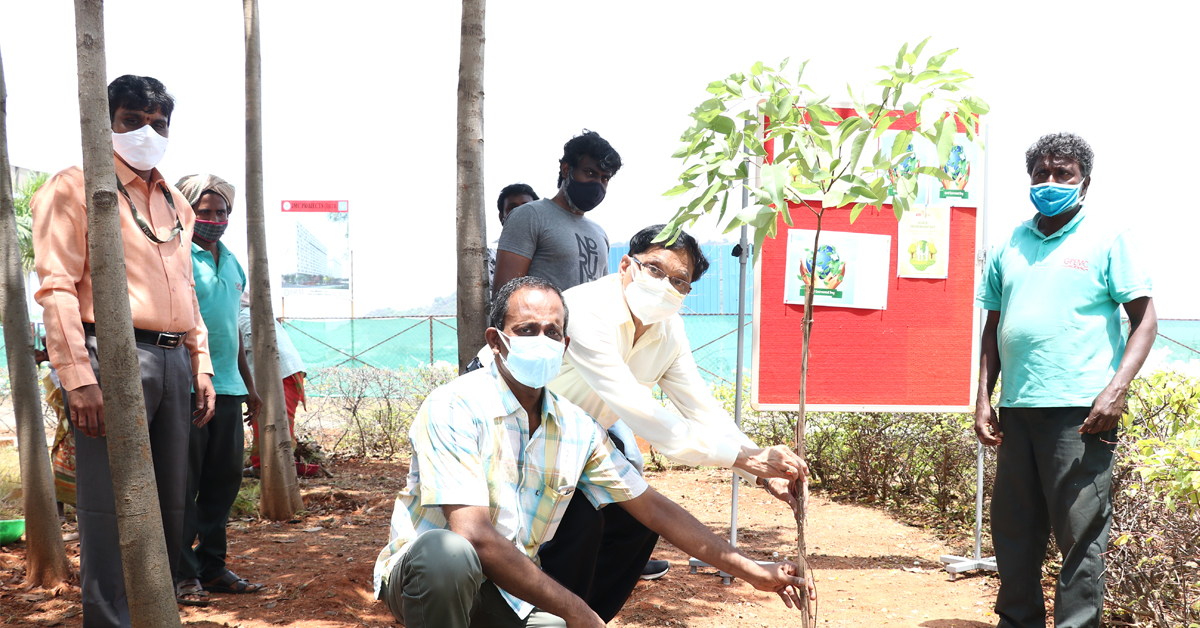 As part of World Environment Day celebrations, SRM University-AP, Andhra Pradesh, plants diverse plant and tree saplings in the campus to pledge commitment as a Generation of Restoration. Prof V S Rao, Vice Chancellor, inaugurating the initiative said that deforestation causes crisis of oxygen and changes in climate by irrevocably destabilizing human life on earth. “Educational and governmental institutions in both villages and cities should take part in conserving the greenery of Earth”, he added. Dr Sivakumar, Deputy Dean, Mr Venkatachalam, Director – Campus Life, Mr Venugopal, Media and PRO and other officials in the University were present on the occasion adhering all the Covid-19 protocols. The Student Affairs Department also conducted an online quiz competition as part of World Environment Day awareness programmes
As part of World Environment Day celebrations, SRM University-AP, Andhra Pradesh, plants diverse plant and tree saplings in the campus to pledge commitment as a Generation of Restoration. Prof V S Rao, Vice Chancellor, inaugurating the initiative said that deforestation causes crisis of oxygen and changes in climate by irrevocably destabilizing human life on earth. “Educational and governmental institutions in both villages and cities should take part in conserving the greenery of Earth”, he added. Dr Sivakumar, Deputy Dean, Mr Venkatachalam, Director – Campus Life, Mr Venugopal, Media and PRO and other officials in the University were present on the occasion adhering all the Covid-19 protocols. The Student Affairs Department also conducted an online quiz competition as part of World Environment Day awareness programmes
World Environment Day is observed annually to fundamentally raise awareness among people about the importance of ecosystem preservation. This year’s theme is ‘Reimagine. Recreate. Restore.’
- Published in News
Dr Lakhveer Singh expounds alternate energy sources
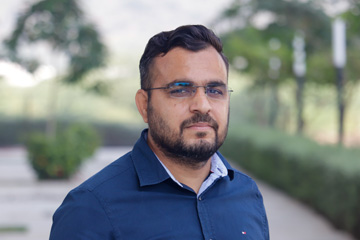 A scientific research paper has been published by Dr Lakhveer Singh, Assistant Professor in the Department of Environmental Science, SRM University-AP.
A scientific research paper has been published by Dr Lakhveer Singh, Assistant Professor in the Department of Environmental Science, SRM University-AP.
“The Role of Conductive Nanoparticles in Anaerobic Digestion: Mechanism, Current Status, and Future Perspectives”, published in the Chemosphere Journal, discusses in detail the application of conductive nanoparticles to enhance the AD process efficiency and the interaction between microbes in anaerobic conditions for electron transfer with the help of CNPs. Application of a variety of conductive nanomaterials as an additive is discussed with their potential biogas production and treatment enhancement in the anaerobic digestion process. The Impact factor of the journal is 5.77.
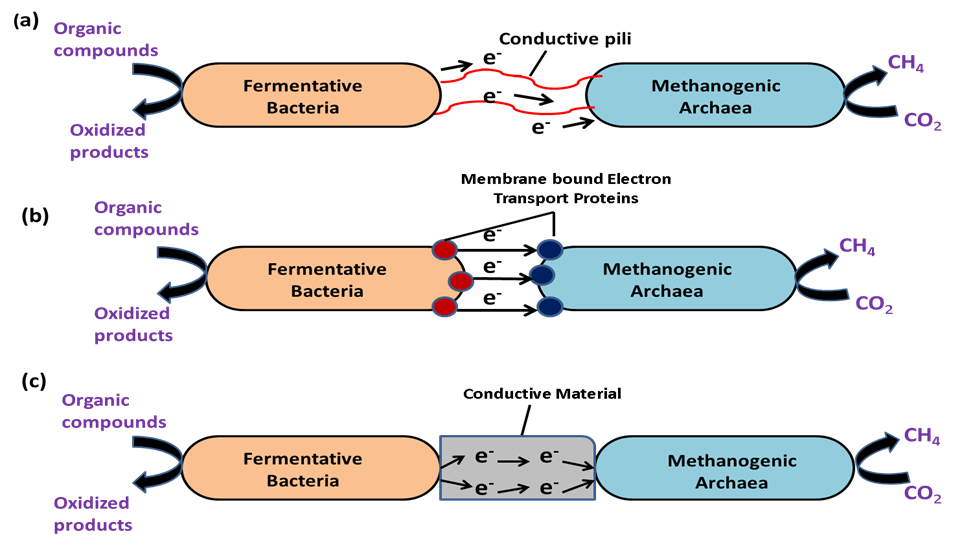
Dr Singh is an Editorial Board member of the Journal of Biomass Conversion and Biorefinery – Springer (I.F. 2.60) and a Guest Editor for Bioresource Technology Reports- Elsevier. His future research targets to reduce the component costs and test the proposed design using real waste streams, as well as continue to increase the reactor volume.
Read the full paper here: https://doi.org/10.1016/j.chemosphere.2021.130601
- Published in ENVS News, News, Research News

